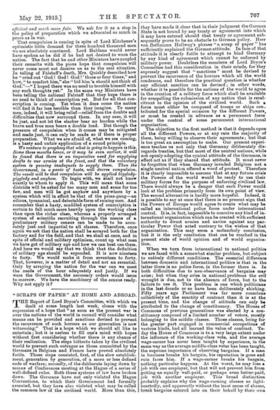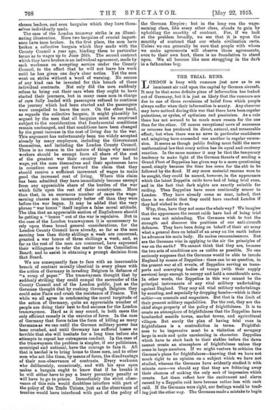" SCRAPS OF PAPER " AT HOME AND ABROAD.
THE Report of Lord Bryce's Committee, with which we dealt at some length last week, closes with the expression of a hope that "as soon as the present war is over the nations of the world in council will consider what means can be provided and sanctions devised to prevent the recurrence of such horrors as our generation is now witnessing." That is a hope which we should all like to entertain ; but it is useless to fill one's mind with hopes without first considering whether there is any chance of their realization. The steps hitherto taken by the civilized world to prevent such outrages as those committed by the Germans in Belgium and France have proved absolutely futile. Those steps consisted, first, of the slow establish- ment, generation by generation, of a more or less defined code of warfare; secondly, of the deliberate laying down by means of Conferences meeting at the Hague of a series of well-defined rules. Both those systems of law have broken down. The Germans have not only violated the Hague Conventions, to which their Government had formally assented, but they have also violated what may be called the common law of the civilized world. More than this,
they have made it clear that in their judgment the German State is not bound by any treaty or agreement into which it may have entered should that treaty or agreement sub- sequently prove to be an obstacle to German policy. Herr von Bethmann Hollweg's phrase "a scrap of paper " has sufficiently explained the German attitude. In face of that attitude it is clearly futile to attempt to bind Germany by any kind of agreement which cannot be enforced by military power. Doubtless the members of Lord Bryce's Committee had this consideration in their minds, for they expressly suggest that " sanctions " must be devised to prevent the recurrence of the horrors which all the world condemns, and therefore the practical question is whether any efficient sanction can be devised ; in other words, whether it 'is possible for the nations of the world to agree in the creation of a military force which shall be available for compelling the submission of any nation that is recal- citrant to the opinion of the civilized world. Such a force must either be composed of troops or ships eon_ tributed for the special occasion by the different Powers. or must be created in advance as a permanent force under the control of some permanent international organization. The objection to the first method is that it depends upon all the different Powers, or at any rate the majority of them, being willing to observe their agreements ; but that is too great an assumption to make. Our present experi- ence teaches us not only that Germany deliberately dis- regards treaties, but that most of the neutral nations, while not openly adopting the cynical attitude of the Germans, in effect act as if they shared that attitude. It must never be forgotten that when Germany invaded Belgium not a single neutral nation offered a word of protest. Therefore it is clearly impossible to assume that at any future crisis the Powers of the world would be ready to use their military forces for the purpose of enforcing civilized law. There would always be a danger that each Power would look at the problem primarily from its own point of view. The second alternative is hardly more hopeful. Indeed, it is possible to say at once that there is no present sign that the Powers of Europe would agree to create what may be called an international police force under international control. Ibis, in fact, impossible to conceive any kind of in- ternational organization which can be created with sufficient authority to direct armies and navies against any par- ticular Power that acted contrary to the wishes of that organization. This may seem a melancholy conclusion, but it is the only conclusion that can be reached in the present state of world opinion and of world organiza- tion.
When we turn from international to national politics we are faced with a somewhat similar problem, but subject to entirely different conditions. The essential difference between domestic and international politics is that in the latter there is no police force, in the former there is. In both difficulties due to non-observance of bargains may arise ; but when they arise in national problems the evil wrought is due, not to the absence of force, but to the failure to use it. This problem is one which politicians in the last decade or so have been deliberately shirking. Fifty years ago Parliament was far more conscious collectively of the sanctity of contract than it is at the present time, and the change of attitude can only be attributed to the change of constituency. The House of Commons of previous generations was elected by a con- stituency composed of a limited number of voters, mostly belonging to the middle classes. Those classes, being for the greater part engaged in commercial occupations of various kinds, had all learned the value of contract. To- day the House of Commons is to a very large extent under the influence of the working-class vote, and the average wage-earner has never been taught by experience, in the same way as the average middle-class voter has been taught, the supreme importance of observing bargains. If a man in business breaks his bargain, his reputation is gone and ruin faces him. If a wage-earner breaks his bargain, nothing particular happens. At the worst, he may lose a job with one employer, but that will not prevent him from getting an equally well-paid, or perhaps even better-paid, job with another employer. This broad distinction probably explains why the wage-earning classes eo light- heartedly, and apparently without the least sense of shame, break bargains entered into on their behalf by their own chosen leaders, and even bargains which they have them- selves individually made.
The case of the London tramway strike is an illumi- nating illustration. Here two bargains of crucial import- ance have been broken. In the first place, the men have broken a collective bargain which they made with the County Council a year ago, binding them to particular terms as to wages up to June 26th. The second contract which they have broken is an individual agreement, made by each workman on accepting service under the County Council, to the effect that be will not leave his work until he has given one day's clear notice. Yet the men went on strike without a word of warning. No excuse of any kind can be invented for this breach of these individual contracts. Not only did the men suddenly refuse to bring out their cars when they ought to have started their journeys, but in many cases men in charge of cars fully loaded with passengers refused to continue the journey which had been started and the passengers were compelled to leave the cars. On the other hand, as regards the collective bargain, it might plausibly be argued by the men that all bargains must be construed subject to the consideration that fundamental conditions remain unchanged, and that conditions have been changed by the great increase in the cost of living due to the war. This argument has unfortunately been too widely accepted already by many employers, including the Government themselves, and including the London County Council. There is no reason in the nature of things why manual workers should be exempt from all share of the cost of the greatest war their country has ever bad to wage, yet the men themselves and their spokesmen have in countless cases put forward the claim that they should receive a sufficient increment of wages to make good the increased cost of living. Where this claim has been admitted they have immediately become exempt from any appreciable share of the burden of the war which falls upon the rest of their countrymen. More than that, in an enormous number of cases the wage- earning classes are immensely better off than they were before the war began. It may be added that the very phrase " war bonus " itself implies a false moral attitude. The idea that an appreciable section of Englishmen should be getting a "bonus " out of the war is repulsive. But in the case of the London tramwaymen it is unnecessary to rely upon these broad general considerations, for the London County Council have already, so far as the men earning less than thirty shillings a week are concerned, granted a war bonus of three shillings a week, and, so far as the rest of the men are concerned, have expressed their willingness to refer the matter to the Conciliation Board; and to assist in obtaining a prompt decision from that Board.
We are consequently face to face with an inexcusable breach of contract morally identical in ever" phase with the action of Germany in invading Belgium In defiance of "a scrap of paper." The tramwaymen thought that by suddenly striking they could compel the surrender of the County Council and of the London public, just as the Germans. thought that by rushing through Belgium they could seize Paris and crash the resistance of France. Yet while we all agree in condemning the moral turpitude of the action of Germany, quite an appreciable number of people are doing their best to find excuses for the London tramwaymen. Hard as it may sound, in both cases the only efficient remedy is the exercise of force. In the case of Germany that force takes the form of killing as many Germans as we can until the German military power has been crushed, and until Germany has suffered losses so terrible that she will hesitate for a long time before she attempts to repeat her outrageous conduct. In the case of the tramwaymen the problem is simpler, if our politicians, municipal and national, have the courage to face it. All that is needed is to bring home to these men, and to other men who act like them, by means of force, the disadvantage of their non-observance of contracts. Every workman who deliberately, consciously, and with his eyes open makes a bargain ought to know that if he breaks it be will either have to pay a heavy pecuniary penalty or will have to go to prison. Immediately the strict obser- vance of this rule would doubtless interfere with part of the policy of the Trade Unions, just as the observance of treaties would have interfered with part of the policy of the German Empire ; but in the long run the wage- earning class, like every other class, stands to gain by upholding the sanctity of contract. For, if we look at the problem broadly, we see that it is upon the sanctity of contract that our whole civilization rests. Unless we can generally be sure that people with whom we make agreements will observe those agreements. even to their own hurt, there is no foundation to stand upon. We all become like men struggling in the dark in a fathomless bog.



































 Previous page
Previous page